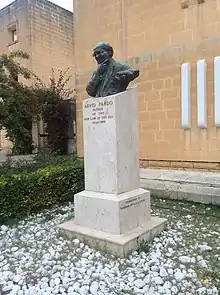International Maritime Law Institute
The IMO International Maritime Law Institute (IMLI) was established in 1988 under the auspices of the International Maritime Organization, a specialised agency of the United Nations.[1] Its mission is to training of specialists in maritime law The Institute is currently headquartered in Malta, on the campus of the University of Malta.

History

IMLI was established in 1988 under an Agreement concluded between IMO and the Government of Malta. It commenced its first academic year in October 1989. Its campus is at the University of Malta.
Programmes
Overview
The Institute offers academic course designed to cover the whole spectrum of international maritime law, including international law, law of the sea, shipping law, marine environmental law, and legislation drafting. Training at the Institute concentrates on three areas:
- The development of expertise to advise on and develop national maritime legislation;
- The development of legislative drafting skills to ensure that States have the necessary expertise to incorporate international rules into domestic legislation; and
- The preparation of lawyers to participate in, and contribute to, the deliberations of the international maritime fora.
The duration of the course is one academic year and successful students are awarded a master's degree (LLM) in International Maritime Law.
More recently the Institute offers other Programmes of Study, ranging from the Doctor of Philosophy in International Maritime Law to an Advanced Diploma for non-lawyers who wish to understand the major features of international maritime law.
Details
IMLI offers three programmes – LL.M., Ph.D. and Advanced Diploma – and a wide number of short, modular courses.[2]
MASTER OF LAWS (LL.M.) IN INTERNATIONAL MARITIME LAW
The Master of Laws (LL.M.) Programme in International Maritime Law is held over one academic year, beginning in September and running until May of the following year. It covers all areas of shipping law, the law of the sea, marine environmental law, maritime security law as well as legislative drafting. Participants are given special training in the techniques of implementation of international maritime conventions and regulations into domestic legislation. The Programme is delivered entirely in English. Since the setting up of the Institute 20 years ago, 464 lawyers from 112 States have graduated from the Institute's LL.M. Programme. Graduates are instrumental in advising their Governments on the need for new or revised laws and regulations in maritime affairs and on their implementation. A high number of IMLI's alumni occupy senior positions in Governments and shipping companies.
DOCTOR OF PHILOSOPHY (Ph.D.) IN INTERNATIONAL MARITIME LAW
The Doctor of Philosophy (Ph.D.) programme is exclusively research-based and involves the writing and defence of a 100,000-word thesis in an area of international maritime law. A prestigious list of world-renowned experts in maritime law acts as supervisors. This is an external degree which must be completed within three to five years and may be undertaken almost entirely from abroad. A Master's degree and university education in law are considered as pre-requisites.
ADVANCED DIPLOMA IN INTERNATIONAL MARITIME LAW
The Advanced Diploma Programme in International Maritime Law is designed to benefit professionals (including those in the most senior levels) who are involved in maritime practice both in the private and in the public sectors and who, because of their careers, are unable to be away from their jobs for any length of time in excess of a few weeks per year. The Programme is structured on a credit system. Candidates must earn a sufficient number of credits after following and successfully completing courses on distinct subject areas to allow him/her the award of an Advanced Diploma. The Programme is open to non-lawyers. Candidates are required to possess a degree from a recognized University or other academic institution, or must possess qualifications of comparable standards, including relevant professional or practical experience, or both, recognized for this purpose by the Institute.
SHORT COURSES
Modular, short-term courses are offered throughout the academic year on selected topics of maritime law. These courses are open to non-lawyers. On request, IMLI also provides tailor-made, intensive training courses and seminars to corporate and international organisations.
Student Body

In order to qualify, students – who primarily should come from developing States – are required to have a first law degree. At IMLI, 50% of the places on the course each year are reserved for women candidates. Candidates are generally nominated and supported by their Governments, but seats are also allocated to independent candidates.
Officials
- Chairman of the Governing Board: Efthimios Mitropoulos
- Director: David Attard (1992–present)
See also
References
- "Achievements". IMO. Retrieved 2012-07-09.
- IMI Shipping & Law Programmes